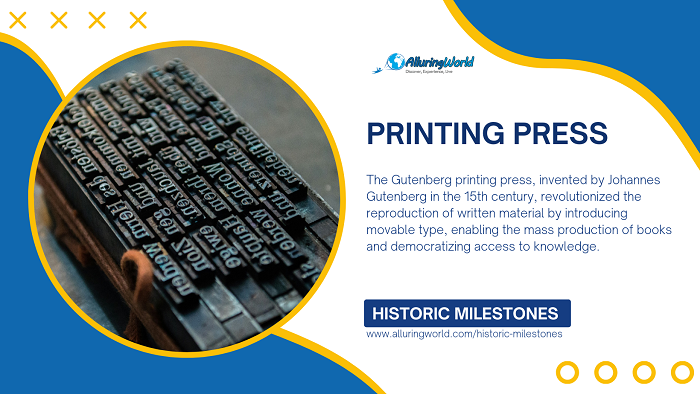Read time ca. 3 minutes
The invention of the printing press in the mid-15th century by Johannes Gutenberg stands as a transformative moment in human history, heralding a revolution in the way information was disseminated. This ingenious device marked the dawn of the modern age, empowering the mass production of books and unleashing an unprecedented era of knowledge accessibility and cultural transformation.
The Gutenberg Press – A Technological Marvel:
Johannes Gutenberg’s groundbreaking invention of the printing press in the 15th century marked a transformative moment in the history of communication and information dissemination. At the core of Gutenberg’s invention was the introduction of movable type, a revolutionary system that departed from traditional methods of manuscript reproduction, where this movable type allowed individual characters, letters, and symbols to be arranged and rearranged on a printing surface, providing an unprecedented level of flexibility in creating text. This innovation replaced the arduous and time-consuming process of hand-copying manuscripts, which was the prevalent method at the time.
Gutenberg’s press, coupled with movable type and oil-based ink, ushered in a new era of printing technology that had a profound impact on the accessibility of knowledge. The printing press enabled the mass production of books at a scale previously unimaginable, democratizing access to information and fostering the spread of ideas. The Gutenberg Bible, printed using this revolutionary technology, stands as a monumental achievement and the first major work produced through the printing press. This masterpiece not only symbolizes the beginning of the print revolution but also serves as a testament to the transformative power of Gutenberg’s invention in shaping the course of human history and culture.
Democratizing Knowledge and Cultural Impact:
This quite important invention did not have only a revolutionary impact on society, but it fundamentally altered the dynamics of knowledge dissemination and challenged the prevailing monopoly on information held by the elite classes. Before the advent of the printing press, books were rare and painstakingly crafted by hand, limiting their availability primarily to the clergy and the affluent. The introduction of the printing press drastically reduced the cost of producing books, democratizing access to knowledge and making literature accessible to a much broader audience.
This newfound accessibility to printed materials played a pivotal role in shaping major historical movements. During the Renaissance, the printing press facilitated the widespread distribution of classical literature, fostering intellectual curiosity and contributing to the rebirth of learning and culture. In the context of the Reformation, the printing press became a powerful tool for disseminating religious texts and challenging the authority of established institutions. Additionally, during the Scientific Revolution, the press played a crucial role in sharing scientific knowledge, enabling collaboration and accelerating the pace of discoveries. The impact of the printing press extended far beyond its technical innovation, profoundly influencing the cultural and intellectual landscape of Europe and laying the groundwork for the modern dissemination of information.
Global Dissemination of Ideas:
As the printing press technology proliferated, it was quite important that it emerged as a powerful catalyst for the globalization of ideas, transcending geographical boundaries and facilitating the exchange of knowledge on an unprecedented scale. The ability to replicate and distribute printed materials across vast distances transformed intellectual communication, fostering a newfound interconnectedness of cultures, where the press played a pivotal role in the dissemination of information through newspapers, pamphlets, and scientific journals, contributing significantly to the rise of public discourse and the formation of informed societies. This increased accessibility to diverse perspectives and information accelerated the pace of intellectual and cultural exchange, ultimately shaping a more interconnected and globally aware world.
Legacy and Continued Impact:
The invention of the printing press not only ushered in a paradigm shift in the dissemination of information, but it also marked a departure from the labor-intensive and limited methods of manual manuscript copying. The ability to reproduce written material on a mass scale fundamentally democratized access to knowledge, paving the way for the widespread availability of books and empowering individuals beyond the privileged elite. This democratization of information was not only instrumental in advancing education but also played a crucial role in societal progress, allowing ideas to flow more freely and fostering a more informed and intellectually engaged citizenry.
The enduring impact of the printing press is evident in the contemporary world, where its foundational principles continue to shape various aspects of society. Mass communication, journalism, and education all bear the indelible imprint of Gutenberg’s invention, serving as a testament to the transformative power of technological innovation. In the modern era, the rapid dissemination of information, the accessibility of printed materials, and the democratization of knowledge owe their roots to the revolutionary breakthrough initiated by the printing press. This enduring legacy underscores the profound and lasting influence that Gutenberg’s invention has had on human culture and progress, exemplifying how a single technological innovation can shape the course of civilization for centuries.

